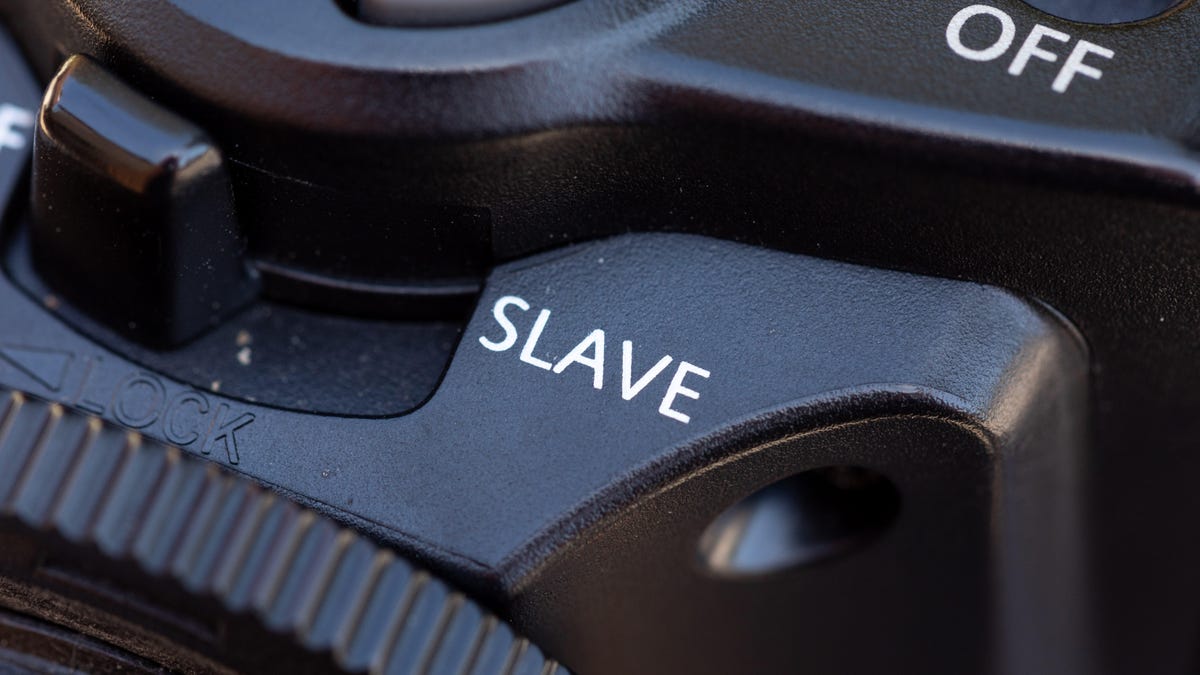'Master' and 'slave': Tech terms face scrutiny amid anti-racism efforts
During Black Lives Matter protests, a movement grows to update terms used with hard drives, camera flashes and databases.

A camera flash shows a switch to change between master and slave modes.
Apple, Google, Microsoft and other Big Tech companies have stepped up their comments on the need for racial justice amid the Black Lives Matter protests that have gripped the US for the past two weeks. Now, a growing group of technologists say the language of the industry itself needs to change in order to fight racism.
The terms "master" and "slave," used to describe the relationships between two computer hard drives and or between two camera flashes, have come under scrutiny because of their association with America's history of slavery. Similarly, "whitelist" and "blacklist," terms for allowing and denying access to a service, are being revisited because of their potentially racial overtones.
"I refuse to use 'whitelist'/'blacklist' or 'master'/'slave' terminology for computers. Join me. Words matter," tweeted Leah Culver, co-founder of the Breaker podcast app and a co-author of the widely used OAuth signon technology. More than 16,000 people liked her tweet.
Photographer Theresa Bear expressed a similar sentiment on the PetaPixel photo site, writing that it's time to "make way for our black community" by banishing the use of "master" and "slave" to refer to how flashes are controlled. "Can you imagine being on set with a black human and the photographer yells to the assistant, 'Hey, can you put it on slave mode?'" Bear asked.
Other terms proposed for sunsetting include "white hat" and "black hat," with "ethical" and "unethical" suggested as replacements.
No one thinks changing the language of technology will bring racial equality to the US, which is still convulsing from protests prompted by the death of George Floyd, the unarmed black man who was killed two weeks ago when a police officer pinned a knee to the back of his neck for nearly nine minutes. But the effort to alter how technology is discussed acknowledges how pervasive racism is and how eager many people are to address it in areas where they might have some direct influence.
"Your beliefs become your thoughts, your thoughts become your words, your words become your actions, your actions become your habits, your habits become your values, your values become your destiny," tweeted Mike Bartlett, a vice president at documentation company Slite, quoting Indian anti-colonial movement leader Mahatma Gandhi.
Engineering terms
The use of "master" and "slave" goes back decades. For hard drives, the terms designate which of a pair controls a shared interface in a computer's internal communications system. When using multiple flashes to take a photograph, the terms refer to which flash is in charge and which responds. You might have seen it in data storage, where a master database is a primary repository and a slave database is a synchronized copy.
The word "master" is also used in the music industry, referencing the primary recording from which other recordings are made. A "golden master" is a similar concept for software. When multiple locomotives are pulling a long train, the one in charge is called a master, with the supporting engines' controls "slaved" to it. Cars' clutches have master and slave cylinders.
Linguists have questioned whether changing language actually alters the underlying concepts. Harvard's Stephen Pinker, describing what he called the euphemism treadmill, observed that people generate new terms to free ideas of baggage with little success. "Water closet" becomes "toilet," which becomes "bathroom," which becomes "restroom." The language changed, but the meaning remained the same.
On Twitter, skeptics were quick to mock the idea. One commenter said it missed the point and encouraged people to vote rather than "playing with words." Another said the terms had long lost their original meaning in tech and encouraged readers to focus on "bigger problems." Scorn dominated the replies to one tweet spotlighting Culver's tweet.
Persuaded to change
Hard drives have used master/slave settings to determine which has priority.
Still, the call to change the language of technology has historical precedents. In 2018, developers of the widely used Python programming language dropped "master/slave." Four years earlier, the team behind Drupal, online publishing software, replaced the terms with "primary/replica," though the change provoked objections from some commenters. In 2003, Los Angeles County asked suppliers and contractors to stop using "master" and "slave" on computer equipment.
Many welcomed the current proposals.
Apple software developer John Wilander tweeted that he's dumped the terms "blacklist" and "whitelist." In computing, those terms refer respectively to collections of blocked entities like insecure passwords and to permitted ones like child-safe websites. He's switched to "block list" and "allow list."
Similarly, Gabriel Csapo, a developer at Microsoft's LinkedIn, said he's submitting requests to change terminology at work. "Exclude and allowed lists are better terms since they translate better and offer similar meaning," he tweeted.
Black Lives Matter. Visit blacklivesmatters.carrd.co to learn how to donate, sign petitions and protest safely.

